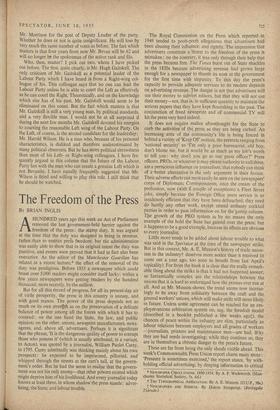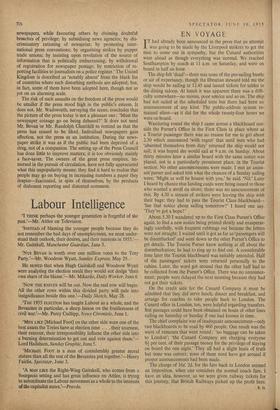The Freedom of the Press
BY BRIAN INGLIS AHUNDRED years ago this week an Act of Parliament removed the last government-held barrier against the freedom of the press: the stamp duty. It was argued at the time that the duty was designed to bring in revenue, rather. than to restrict press freedom: but the administration was easily able to show that in its original intent the duty was punitive, and events soon proved that it had in fact also been restrictive. As the editor of the Manchester Guardian has related in a recent lecture,* the effect of the removal of the duty was prodigious. Before 1855 a newspaper which could boast over 5,000 readers might consider itself lucky; within a few years newspapers were getting readers by the hundred thousand; more recently, by the million.
But for all this record of progress, for all its present-day air of virile prosperity, the press in this country is uneasy, and with good reason. The power of the press depends not so much on its own strenIth as on the preservation of a delicate balance of power among all the forces with which it has to contend : on the one hand the State. the law, and public opinion; on the other, unions, newsprint manufacturers, news- agents, and, above all, advertisers. Perhaps it is significant that the phrase, 'It is the dangerous quality of power to corrupt those who possess it' (which is usually attributed, in a variant, to Acton). was quoted by a journalist, William Paulet Carey. in 1795. Carey admittedly was thinking mainly about his own prospects : he expected to be imprisoned, pilloried, and whipped through the streets at the cart's tail, at the govern- ment's order. But he had the sense to realise that the govern- ment was not his only enemy—that other powers existed which might deprive him of his livelihood. And every journalist today knows at least three, in whose shadow the press stands : adverb tising; the State; and labour trouble. The Royal Commission on the Press which reported- in 1949 tended to pooh-pooh allegations that advertisers had been abusing their influence; and rightly. The impression that advertisers constitute a threat to the freedom of the press is mistaken : on the contrary, it was only through their help that the press became free. The Times burst out of State shackles in the 1820s because advertising revenue had grown large enough for a newspaper to thumb its nose at the government for the first time with impunity. To this day the press's capacity to provide adequate services to its readers depends on advertising revenue. The danger is not that advertisers will use their money to subvert editors, but that they will not use their money—not, that is, in sufficient quantity to maintain the serious papers that they have kept flourishing in the past. The conjunction of freed newsprint and of commercial TV will hit the press very hard indeed.
It does not require malice aforethought for the State to curb the activities of the press as they are being curbed. An increasing area of the community's life is being fenced in behind a variety of 'Keep Off' notices, the pretexts ranging from 'national security' to 'I'm only a poor bureaucrat, old boy, don't blame me, but it would be as much as my job's worth to tell you : why don't you go to our press officer?' Press officers. PROs, or whatever it may please authority to call them, are a pernicious influence on journalism; that nobody can think of a -better alternative is the only argument in their favour. Their adverse effects can most easily be seen on the newspapers' corps of Diplomatic Correspondents, once the cream of the profession. now (with it couple of exceptions) a Fleet Street joke, simply because the Foreign Office press service is so insidiously efficient that they have been debauched; they need do hardly any other work, except attend embassy cocktail parties in order to pass information on for the'gossip column. The growth of the PRO system is, by no means the only example of the hold the State has gained over the press; but it happens to be a good example, because its effects are obvious to every journalist.
Little more needs to be added about labour trouble to what was said in the Spectator at the time of the newspaper strike. But in this context, Mr. A. E. Musson's history of trade union- ism in the industryt deserves more notice than it received (it came out a year ago, too soon to benefit from last April's topicality). For from the book it is clear that the really remark- able thing about the strike is that it had not happened sooner; so fantastically complex are the relationships between the unions that it is hard to understand how the presses ever run at all. And as Mr. Musson shows, the trend seems now increas- ingly to be away from solidarity between the craft and the general workers' unions, which will make strife still more likely in future. Unless some agreement can be reached for an em- ployer‘unions arbitration system on, say, the Swedish model (described in a booklet published a foiw weeks, ago), the chances of peace within the industry are slim, particularly as labour relations between employers and all grades of workers —journalists, printers and maintenance men—are bad. Why they are bad needs investigating; while they continue so. they are in themselves a chronic danger to the press's future.
These are far from being the only shoals visible ahead. This week's Commonwealth Press Union report charts many more : 'Pressure is sometimes exercised,' the report states, `by with- holding official advertising; by denying information to critical • NEWSPAPER CIRCULATIONS, 1800-1954. By A. p. Wadsworth. (Man- chester Statistical Society, 5s. 6d.) THE TYPOGRAPHICAL ASSOCIATION. By A. E. Musson. (0.U.P., 30s.) t NEWSPAPERS AND Sumas. By Hakon Stangerup. (Berlingske Tidende.) newspapers, while favouring others by claiming doubtful breaches of privilege; by subsidising news agencies; by dis- criminatory rationing of newsprint; by promoting inter- national press conventions; by organising strikes by puppet trade unions; by insisting upon revelation of the source of information that is politically embarrassing; by withdrawal of registration for newspaper postage; by restriction of re- porting facilities to journalists on a police register.' The United Kingdom is described as `notably absent' from the black list of countries where such disturbing methods are adopted; but, in fact, some of them have been adopted here, though not as yet on an alarming scale.
The risk of such assaults on the freedom of the press would be smaller if the press stood high in the public's esteem. It does not. Mr. Wadsworth, surveying the scene, concludes that the picture of the press today is not a pleasant one : 'Must the newspaper coinage go on being debased?' It does not need Mr. Bevan or Mr. Randolph Churchill to remind us that the press has ceased to be liked. Individual newspapers gain affection, not the press as an institution. During the news- paper strike it was as if the public had been deprived of a drug, not of a companion. The setting up of the Press Council has done little to improve matters; it is too obviously mainly a face-saver. The owners of the great press empires, im- mersed in the pursuit of circulation, have not fully appreciated what this unpopularity means; they find it hard to realise that people may go on buying in increasing numbers a paper they despise—fascinated, in spite of themselves, by the products of dishonest reporting and distorted comment.











































 Previous page
Previous page